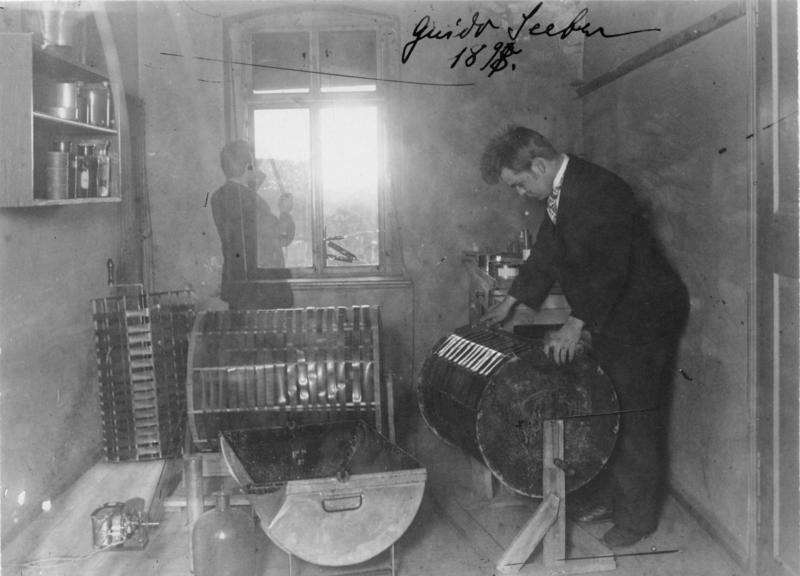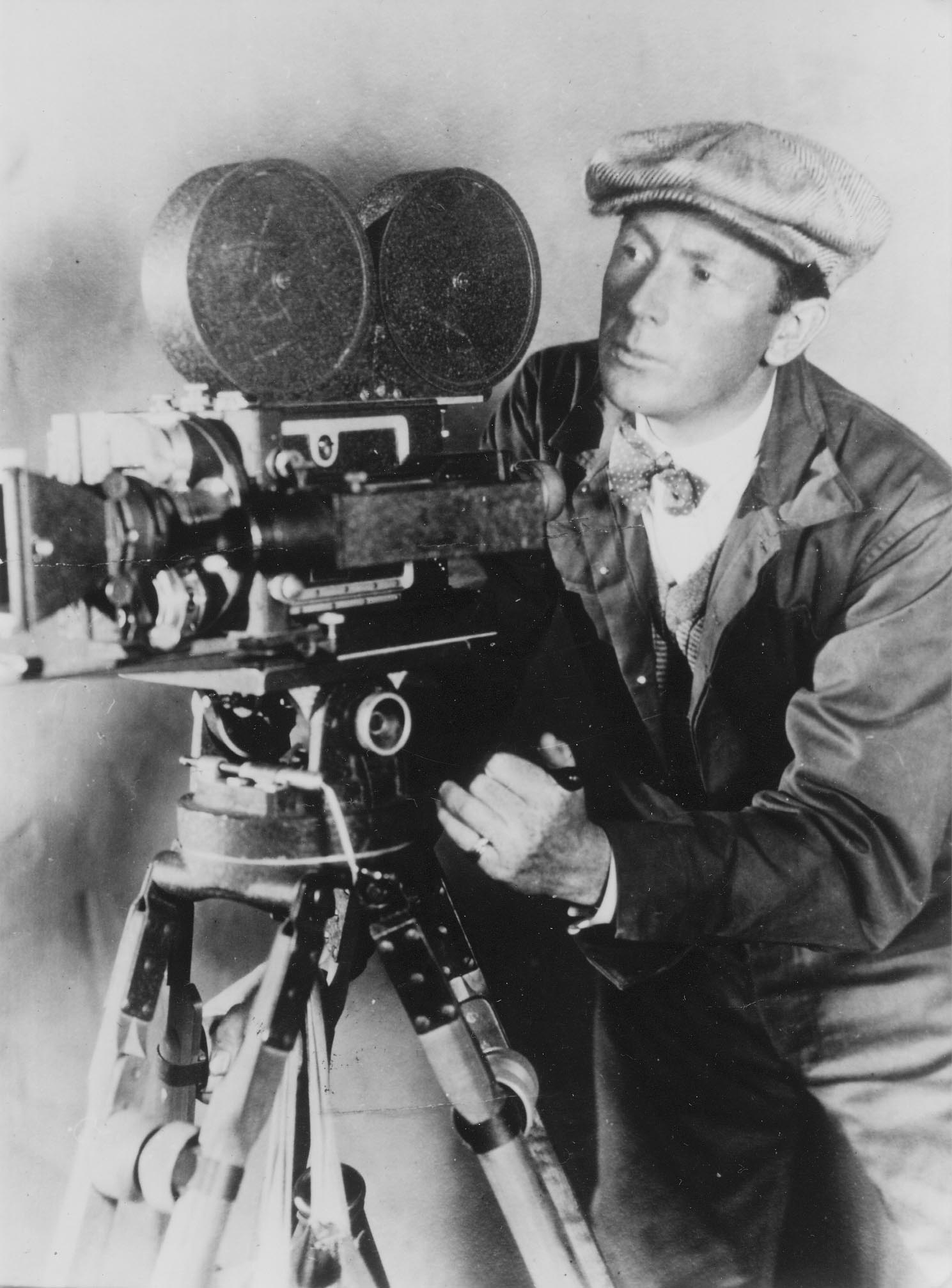|
Guido Seeber
Guido Seeber (22 June 1879 in Chemnitz – 2 July 1940 in Berlin) was a German cinematographer and pioneer of early cinema. Seeber's father, Clemens, was a photographer and therefore Seeber had experience with photography from an early age. In the summer of 1896, he saw the first films of the Lumière Brothers and became fascinated by this new technology. He bought a film camera and devoted himself to the development of cinematography and of sound films. In 1908 he became technical manager of the film company ''Deutsche Bioscop'' and in 1909 directed his first film. His pioneering work as a cinematographer from this time on laid the foundations which other cameramen of German silent film such as Karl Freund, Fritz Arno Wagner and Carl Hoffmann were able to build. In addition to his technical talents with the camera (he developed several special effects techniques), his use of perspective and skillful contrasts between light and dark are noteworthy. His main collaborators were ... [...More Info...] [...Related Items...] OR: [Wikipedia] [Google] [Baidu] |
Bundesarchiv N 1275 Bild-289, Guido Seeber Mit Filmtrockentrommel
, type = Archive , seal = , seal_size = , seal_caption = , seal_alt = , logo = Bundesarchiv-Logo.svg , logo_size = , logo_caption = , logo_alt = , image = Bundesarchiv Koblenz.jpg , image_caption = The Federal Archives in Koblenz , image_alt = , formed = , preceding1 = , preceding2 = , dissolved = , superseding1 = , superseding2 = , agency_type = , jurisdiction = , status = Active , headquarters = PotsdamerStraße156075Koblenz , coordinates = , motto = , employees = , budget = million () , chief1_name = Michael Hollmann , chief1_position = President of the Federal Archives , chief2_name = Dr. Andrea Hänger , chief2_position ... [...More Info...] [...Related Items...] OR: [Wikipedia] [Google] [Baidu] |
Georg Wilhelm Pabst
Georg Wilhelm Pabst (25 August 1885 – 29 May 1967) was an Austrian film director and screenwriter. He started as an actor and theater director, before becoming one of the most influential German-language filmmakers during the Weimar Republic. Early years Pabst was born in Raudnitz, Bohemia, Austria-Hungary (today's Roudnice nad Labem, Czech Republic), the son of a railroad official. While growing up in Vienna, he studied drama at the Academy of Decorative Arts and initially began his career as a stage actor in Switzerland, Austria and Germany. In 1910, Pabst traveled to the United States, where he worked as an actor and director at the German Theater in New York City. In 1914, he decided to become a director, and he returned to recruit actors in Europe. Pabst was in France when World War I began, he was arrested and held as an enemy alien and interned in a prisoner-of-war camp near Brest. * * * While imprisoned, Pabst organised a theatre group at the camp and directed French ... [...More Info...] [...Related Items...] OR: [Wikipedia] [Google] [Baidu] |
Fridericus Rex
''Fridericus Rex'' (German: ''Fridericus Rex - 1. Teil: Sturm und Drang'') is a 1922 German silent historical film directed by Arzén von Cserépy and starring Otto Gebühr, Albert Steinrück and Gertrud de Lalsky. It portrays the life of the eighteenth century monarch Frederick the Great. Immensely popular, it was followed by three sequels and launched the Prussian film as a major German genre during the Weimar era.Schulte-Sasse p.93 The film's sets were designed by the art directors Hans Dreier and Ernö Metzner. The film was shot at the Johannisthal Studios in Berlin. Location filming took place at the Charlottenburg Palace and other sites around historic Brandenburg. Cast * Otto Gebühr as Friedrich * Albert Steinrück as Friedrich Wilhelm I * Gertrud de Lalsky as Sophie Dorothee * Charlotte Schultz as Wilhelmine * Erna Morena as Elisabeth Christine von Braunschweig-Bevern * Lilly Flohr as Frau von Morien * Eduard von Winterstein as Leopold Fürst von Anhalt-Dessau ... [...More Info...] [...Related Items...] OR: [Wikipedia] [Google] [Baidu] |
Impostor (1921 Film)
''Impostor'' (German: ''Hochstapler'') is a 1921 German silent film directed by Werner Funck and starring Paul Hartmann and Olga Tschechowa.Bock & Bergfelder p.485 The film's sets were designed by the art director Carl R. Reiner. Cast * Werner Funck * Paul Hartmann * Leonhard Haskel * Albert Patry * Olga Tschechowa Olga Konstantinovna Chekhova (; russian: Ольга Константиновна Чехова; 14 April 1897 – 9 March 1980), known in Germany as Olga Tschechowa, was a Russian-German actress. Her film roles include the female lead in Alfred ... References Bibliography * Bock, Hans-Michael & Bergfelder, Tim. ''The Concise Cinegraph: Encyclopaedia of German Cinema''. Berghahn Books, 2009. External links * 1921 films Films of the Weimar Republic German silent feature films Films directed by Werner Funck German black-and-white films {{Germany-silent-film-stub ... [...More Info...] [...Related Items...] OR: [Wikipedia] [Google] [Baidu] |
The Wandering Image
''The Wandering Image'' (German: ''Das wandernde Bild'') is a 1920 German silent drama film directed by Fritz Lang and starring Mia May, Hans Marr and Rudolf Klein-Rogge. It is also known by the alternative titles of ''The Wandering Picture'' and ''The Wandering Shadow'' (USA DVD title). The film's sets were designed by Otto Hunte. The art directors Erich Kettelhut and Robert Neppach were employed designing models for the production.Bock & Bergfelder p.240 Cast *Mia May as Irmgard Vanderheit *Hans Marr as Georg Vanderheit / John Vanderheit *Harry Frank *Rudolf Klein-Rogge as Georgs Vetter Wil Brand *Loni Nest Eleonore "Loni" Arnault ( Nest, 4 August 1915 – 2 October 1990), known professionally by her maiden name of Loni Nest, was a German actress. Born in Berlin, she was a child star of German silent films in the 1920s. She was filmed for the first ... as Irmgards Tochter References Bibliography * Bock, Hans-Michael & Bergfelder, Tim. ''The Concise CineGraph. Encycl ... [...More Info...] [...Related Items...] OR: [Wikipedia] [Google] [Baidu] |
The Traitress
''The Traitress'' (German: ''Die Verräterin'') is a 1911 German silent drama film directed by Urban Gad and starring Asta Nielsen, Max Obal and Robert Valberg.Bock & Bergfelder p.145 It was shot at the Babelsberg Studios in Berlin. Cast * Asta Nielsen as Yvonne * Max Obal as Marquis de Bougival * Robert Valberg as Lieutenant von Mallwitz * Emil Albes Friedrich Emil Albes (30 October 1861 – 22 March 1923) was a German actor and film director of the silent era.Giesen p.171 Selected filmography * ''The Traitress'' (1911) * '' Poor Jenny'' (1912) * '' The Dance of Death'' (1912) * '' Veritas ... as Vujrat, leader of the partisans References Bibliography * Bock, Hans-Michael & Bergfelder, Tim. ''The Concise CineGraph. Encyclopedia of German Cinema''. Berghahn Books, 2009. External links * 1911 films Films directed by Urban Gad German silent feature films Films of the German Empire German black-and-white films Franco-Prussian War films Films shot at Babelsber ... [...More Info...] [...Related Items...] OR: [Wikipedia] [Google] [Baidu] |
Animation
Animation is a method by which image, still figures are manipulated to appear as Motion picture, moving images. In traditional animation, images are drawn or painted by hand on transparent cel, celluloid sheets to be photographed and exhibited on film. Today, most animations are made with computer-generated imagery (CGI). Computer animation can be very detailed Computer animation#Animation methods, 3D animation, while Traditional animation#Computers and traditional animation, 2D computer animation (which may have the look of traditional animation) can be used for stylistic reasons, low bandwidth, or faster real-time renderings. Other common animation methods apply a stop motion technique to two- and three-dimensional objects like cutout animation, paper cutouts, puppets, or Clay animation, clay figures. A cartoon is an animated film, usually a short film, featuring an cartoon, exaggerated visual style. The style takes inspiration from comic strips, often featuring anthropomorphi ... [...More Info...] [...Related Items...] OR: [Wikipedia] [Google] [Baidu] |
Universum Film AG
UFA GmbH, shortened to UFA (), is a film and television production company that unites all production activities of the media conglomerate Bertelsmann in Germany. Its name derives from Universum-Film Aktiengesellschaft (normally abbreviated as ''UFA''), a major German film company headquartered in Babelsberg, producing and distributing motion pictures from 1917 until the end of the Nazi era. The name UFA was revived by Bertelsmann for an otherwise unrelated film and television outfit, UFA GmbH. The original UFA was established as Universum-Film Aktiengesellschaft on December 18, 1917, as a direct response to foreign competition in film and propaganda. UFA was founded by a consortium headed by Emil Georg von Stauß, a former Deutsche Bank board member. In March 1927, Alfred Hugenberg, an influential German media entrepreneur and later Minister of the Economy, Agriculture and Nutrition in Hitler's cabinet, purchased UFA and transferred ownership of it to the Nazi Party in 1933. ... [...More Info...] [...Related Items...] OR: [Wikipedia] [Google] [Baidu] |
Stroke
A stroke is a medical condition in which poor blood flow to the brain causes cell death. There are two main types of stroke: ischemic, due to lack of blood flow, and hemorrhagic, due to bleeding. Both cause parts of the brain to stop functioning properly. Signs and symptoms of a stroke may include an inability to move or feel on one side of the body, problems understanding or speaking, dizziness, or loss of vision to one side. Signs and symptoms often appear soon after the stroke has occurred. If symptoms last less than one or two hours, the stroke is a transient ischemic attack (TIA), also called a mini-stroke. A hemorrhagic stroke may also be associated with a severe headache. The symptoms of a stroke can be permanent. Long-term complications may include pneumonia and loss of bladder control. The main risk factor for stroke is high blood pressure. Other risk factors include high blood cholesterol, tobacco smoking, obesity, diabetes mellitus, a previous TIA, end-st ... [...More Info...] [...Related Items...] OR: [Wikipedia] [Google] [Baidu] |
Indiana University Press
Indiana University Press, also known as IU Press, is an academic publisher founded in 1950 at Indiana University that specializes in the humanities and social sciences. Its headquarters are located in Bloomington, Indiana. IU Press publishes 140 new books annually, in addition to 39 academic journals, and maintains a current catalog comprising some 2,000 titles. Indiana University Press primarily publishes in the following areas: African, African American, Asian, cultural, Jewish, Holocaust, Middle Eastern studies, Russian and Eastern European, and women's and gender studies; anthropology, film studies, folklore, history, bioethics, music, paleontology, philanthropy, philosophy, and religion. IU Press undertakes extensive regional publishing under its Quarry Books imprint. History IU Press began in 1950 as part of Indiana University's post-war growth under President Herman B Wells. Bernard Perry, son of Harvard philosophy professor Ralph Barton Perry, served as the first d ... [...More Info...] [...Related Items...] OR: [Wikipedia] [Google] [Baidu] |
The Last Laugh (1924 Film)
''The Last Laugh'' (german: Der letzte Mann, ) is a 1924 German silent film directed by German director F. W. Murnau from a screenplay written by Carl Mayer. The film stars Emil Jannings and Maly Delschaft. Stephen Brockmann summarized the film's plot as, "a nameless hotel doorman loses his job".Prager, Brad. A critical history of German film. Monatshefte, Volume 103, No. 3 (Fall 2011), pp. 472-474; (p.473) It is a cinematic example of the ''Kammerspielfilm'' or "chamber-drama" genre, which follows the style of short, sparse plays of lower middle-class life that emphasized the psychology of the characters rather than the sets and action. The genre tried to avoid the intertitles (title cards) of spoken dialogue or description that characterize most silent films, in the belief that the visuals themselves should carry most of the meaning. In 1955, the film was remade starring Hans Albers. The film was voted number 11 on the prestigious Brussels 12 list at the 1958 World Expo. P ... [...More Info...] [...Related Items...] OR: [Wikipedia] [Google] [Baidu] |
Friedrich Wilhelm Murnau
Friedrich Wilhelm Murnau (born Friedrich Wilhelm Plumpe; December 28, 1888March 11, 1931) was a German film director, producer and screenwriter. He was greatly influenced by Schopenhauer, Nietzsche, Shakespeare and Ibsen plays he had seen at the age of 12, and became a friend of director Max Reinhardt. During World War I he served in the Imperial German Army, initially as an infantry company commander on the Eastern Front. Murnau later transferred to the German Army's Flying Corps, as an observer/ gunner, and survived several crashes without any severe injuries. One of Murnau's acclaimed works is the film ''Nosferatu'' (1922), an adaptation of Bram Stoker's ''Dracula''. Although not a commercial success, owing to copyright issues with Stoker's estate, the film is considered a masterpiece of German Expressionist cinema. He later directed the film '' The Last Laugh'' (1924), as well as a 1926 interpretation of Goethe's ''Faust''. He emigrated to Hollywood in 1926, where he joi ... [...More Info...] [...Related Items...] OR: [Wikipedia] [Google] [Baidu] |




.jpg)
